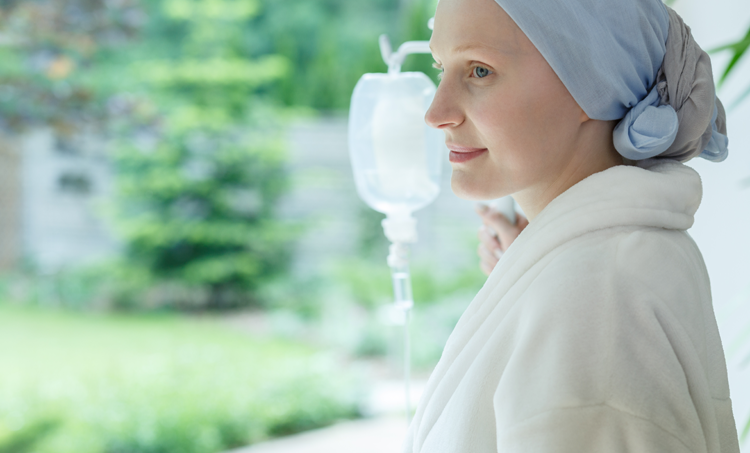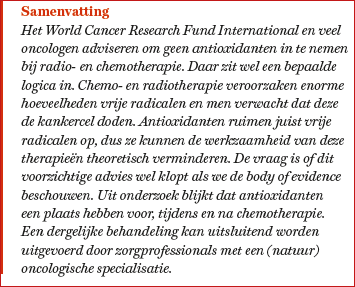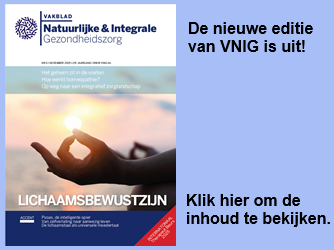Kanker en de antioxidanten-paradox

Door Gabriël Devriendt
 Patiënten die chemotherapie of radiotherapie moeten ondergaan krijgen van hun oncoloog te horen dat zij zeker geen antioxidanten mogen nemen gedurende hun therapie. Dit statement is nogal verwarrend want tegelijkertijd krijgen ze de aanbeveling zo gezond mogelijk te eten; met antioxidanten dus.
Patiënten die chemotherapie of radiotherapie moeten ondergaan krijgen van hun oncoloog te horen dat zij zeker geen antioxidanten mogen nemen gedurende hun therapie. Dit statement is nogal verwarrend want tegelijkertijd krijgen ze de aanbeveling zo gezond mogelijk te eten; met antioxidanten dus.
De belangrijkste informatiebronnen voor de arts zijn, naast de farmaceutische bedrijven, stichtingen en instellingen tegen kanker, zoals het World Cancer Research Fund International.1,2 Op de website van die laatste staat heel duidelijk dat voedingssupplementen ‘not done’ zijn samen met conventionele therapieën, want dat is mogelijk gevaarlijk.
Eigenaardig genoeg staat er eveneens vermeld geen voedingssupplementen te gebruiken als kankerpreventie hoewel er intussen duizenden studies zijn die het tegenovergestelde bewijzen.3 Het WCRFI is voor oncologen de voornaamste bron voor informatie over voedingssupplementen.
Dat vraagt om factchecken. Bekijken we hun referenties dan blijkt als voornaamste onderzoek de CARET-studie (1996) te worden aangehaald. Daarin de stelling dat hoge doseringen van de supplementen bètacaroteen en vitamine E het risico op longkanker mogelijk doen stijgen. Het EFSA (European Food Safety Authority) publiceerde officieel een rechtzetting op deze studie wegens de onjuiste negatieve conclusie. In positieve studies, te vinden via PubMed, wordt natuurlijk bètacaroteen gebruikt, waar in de CARET-studie synthetisch caroteen is gebruikt in heel hoge dosering. Dit wordt nergens vermeld noch rechtgezet.
Verder staan er bij de nogal pover aanwezige referenties op de website van WCRF alleen negatieve studies met synthetische vit A (retinol ) in extreem hoge doseringen, of een studie met een vit C-derivaat dat niet gebruikt wordt in voedingssupplementen. Voor het overige alleen studies met de conclusie ‘zou de farmakinetica van het farmacon kunnen beïnvloeden’.
Lees het gehele artikel vanaf pagina 44 in OrthoFyto 4/22.
Bronvermelding:
Bronvermelding:
1. World Cancer Research Fund. Do not use supplements for cancer prevention. Geraadpleegd op 31 mei via www.wcrf.org
2. International Agency for research on Cancer (World Health Organisation). List of institutions funding cancer research. Geraadpleegd op 31 mei via www.iarc.who.int
3. Zoekopdracht in PubMed : pubmed.ncbi.nlm.nih.gov/?term=antioxidants+and+prevention+of+cancer&page=1
4. Wieland, L. S., Moffet, I., Shade, S., Emadi, A., Knott, C., Gorman, E. F., & D'Adamo, C. (2021). Risks and benefits of antioxidant dietary supplement use during cancer treatment: protocol for a scoping review. BMJ open, 11(4), e047200.
5. Keith I. Block et al. Impact of antioxidant supplementation on chemotherapeutic toxicity: A systematic review of the evidence from randomized controlled trials. Int. J. Cancer: 123, 1227–1239 (2008).
6. Chemotherapy Side Effects | American Cancer Society. Geraadpleegd op 31 mei 2022 via www.cancer.org
7. Singh, K., Bhori, M., Kasu, Y. A., Bhat, G., & Marar, T. (2018). Antioxidants as precision weapons in war against cancer chemotherapy induced toxicity – Exploring the armoury of obscurity. Saudi pharmaceutical journal : SPJ : the official publication of the Saudi Pharmaceutical Society, 26(2), 177–190.
8. Simone, C. B., 2nd, Simone, N. L., Simone, V., & Simone, C. B. (2007). Antioxidants and other nutrients do not interfere with chemotherapy or radiation therapy and can increase kill and increase survival, Part 1 and 2. Alternative therapies in health and medicine, 13(2), 40–47.
9. Bukowski, K., Kciuk, M., & Kontek, R. (2020). Mechanisms of Multidrug Resistance in Cancer Chemotherapy. International journal of molecular sciences, 21(9), 3233.
10. Plaks V. et al. The cancer stem cell niche: how essential is the niche in regulating stemness of tumor cell. Cell Stem Cell 16, March 5, 2015; 225-238.
11. Thienpont B. et al. (2016). Tumour hypoxia causes DNA hypermethylation by reducing TET activity. Nature 2016, August 17.
12. Yanlei Ma, Peng Zhang, Feng Wang, et al. The relationship between early embryo development and tumourigenesis. J. Cell. Mol. Med. 2010. Vol 14, No 12 pp. 2697-2701.
13. Laura M. Pérez et al. Unhealthy Stem Cells: When Health Conditions Upset Stem Cell Properties. Cell Physiol Biochem 2018;46:1999-2016.
14. Christoph Ufer. The Roles of Glutathione Peroxidases during Embryo Development. Front Mol Neurosci. 2011; 4: 12.
15. Watson J. Do antioxidants promote cancer? New Scientist Volume 217, Issue 2908, 16 March 2013, Pages 28-29.
16. Watson J. Oxidants, antioxidants and the current incurability of metastatic cancers. Open Biol. 2013 Jan; 3(1): 120144.
17. Reliene, R., & Schiestl, R. H. (2006). Glutathione depletion by buthionine sulfoximine induces DNA deletions in mice. Carcinogenesis, 27(2), 240–244.
18. Hyang-Rim Lee Mol. Adaptive response to GSH depletion and resistance to L-buthionine-(S,R)-sulfoximine: involvement of Nrf2 activation. Cell Biochem 2008 Nov;318(1-2):23-31.
19. Eid, S.Y et al. Natural Products Modulate the Multifactorial Multidrug Resistance of Cancer. Pharmacology & Pharmacy, 6, 146-176.
20. Bootsa A et al. The quercetin paradox. Toxicology and Applied Pharmacology Volume 222, Issue 1, 1 July 2007, . Pages 89-96.
21. Estrela J. Glutathione in cancer biology and therapy. Crit Rev Clin Lab Sci 2006;43(2):143-81.
22. Ortega A et al. Glutathione in Cancer Cell Death. Cancers 2011, 3, 1285-1310.
23. Bracke M et al. Influence of tangeretin on tamoxifen's therapeutic benefit in mammary cancer. J Natl Cancer Inst . 1999 Feb 17;91(4):354-9. doi: 10.1093/jnci/91.4.354.
24. Hindu Kalluru et al. Effect of turmeric supplementation on the pharmacokinetics of paclitaxel in breast cancer patients: A study with population pharmacokinetics approach. Phytother Res . 2022 Apr;36(4):1761-1769.
25. Guha, N., Kwan, M. L., Quesenberry, C. P., Jr, Weltzien, E. K., Castillo, A. L., & Caan, B. J. (2009). Soy isoflavones and risk of cancer recurrence in a cohort of breast cancer survivors: the Life After Cancer Epidemiology study. Breast cancer research and treatment, 118(2), 395–405.
26. Ralph W. Moss, PhD. Should patients undergoing chemotherapy and radiotherapy be prescribed antioxidants? Integr Cancer Ther 2006 Mar;5(1):63-82.
27. Edith Heinrich and Nikola Getoff. Mitomycin C-Activity effected by Vitamins B1, C, E and Carotene under irradiation with γ-rays. Z. Naturforsch. 58c, 244-248 (2003); received October 11/November 7, 2002.
28. Trachootham, D., Alexandre, J., & Huang, P. (2009). Targeting cancer cells by ROS-mediated mechanisms: a radical therapeutic approach? Nature reviews. Drug discovery, 8(7), 579–591.
Gabriel Devriendt
heeft vanaf 1976 ruim twintig jaar voor diverse medische specialismen gewerkt waarvan de laatste tien jaar als universitair productspecialist in de oncologie. In deze jaren heeft hij zich vergaand ontwikkeld op het terrein van de farmacologie en biochemie.

